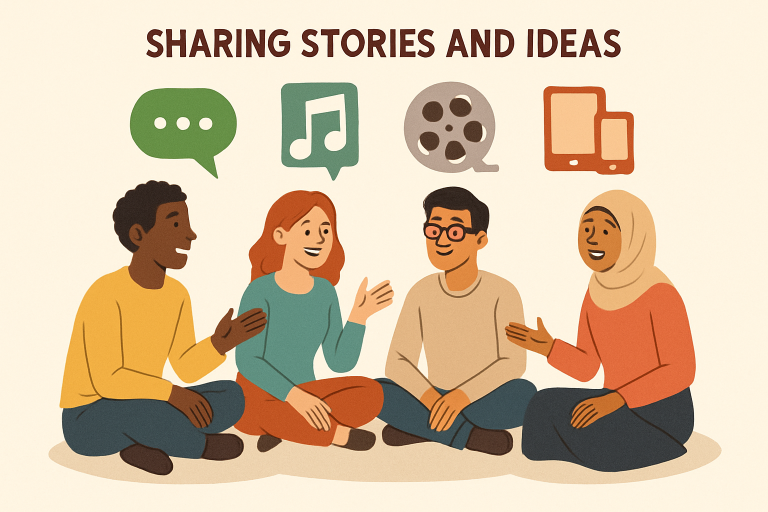Creative storytelling has been vital for unifying people, sharing ideas, and driving cultural evolution. It has shaped societies’ memories and futures through art, performance, and multimedia. The fusion of creativity and storytelling has led to powerful movements in music, art, and popular media, contributing to modern culture. As culture becomes interconnected, the impact of creative storytelling continues to expand. Artists and creators draw upon ancient traditions while innovating with new media, blurring the boundaries between audience and performer and local and global influences. Stories across genres and geographies serve as bridges between communities, fostering empathy and dialogue in a rapidly changing world. Creative expression captures societal moods and aspirations, acting as a catalyst for cultural identity and change.
The Power Of Storytelling: An Age-Old Tradition
Storytelling is as ancient as human civilization itself. Before written language, oral traditions passed down knowledge, values, and lessons. These stories, often symbolic and spiritual, gave communities a sense of belonging. Over time, storytelling evolved with cultural and technological changes—from cave paintings to epic poetry, then to novels and cinema. Today, storytelling remains central to cultural expression. By framing ideas in stories, creators make complex concepts more emotionally engaging and accessible. For a modern example of storytelling through music, Steven Machat I Can Hear Music illustrates how narrative can be woven into song. Storytelling isn’t just entertainment—it’s a key way to understand and interpret the world.

How Creativity Drives Modern Media
Modern media is driven by stories that engage, inform, and inspire, with creativity fueling innovations across film, TV, podcasts, and digital platforms. Filmmakers and producers experiment with narrative, visuals, and sound to move audiences emotionally and intellectually. Digital tools democratize expression, enabling individuals to share their voices widely. Social media, user content, and interactive formats blur creator-audience lines, fostering evolving participatory storytelling.
Artists As Catalysts For Societal Change
Throughout history, artists have been visionaries—challenging the status quo, questioning power, and amplifying marginalized voices. Iconic musicians, painters, filmmakers, and writers lead social movements, offering perspectives that sway public opinion or inspire activism. Today, their role remains vital as artists use their platforms to spotlight urgent issues like climate justice and racial equality. Art and storytelling help communities process grief, celebrate resilience, and envision a better future, serving as vital tools for empathy and social progress.
Music And Identity In A Global Society
Music is one of the most powerful vehicles for storytelling, cultural memory, and identity. As globalization accelerates, musical genres and traditions intermingle, creating new hybrids that resonate across borders. Music’s narrative power helps individuals shape their sense of self and community, connecting them to heritage while opening doors to new influences.
Technology’s Role In Evolving Narratives
From the printing press to virtual reality, innovations have reshaped storytelling. Today, smartphones and the internet make content creation accessible worldwide. Technologies like AR, VR, and AI offer immersive stories that challenge traditional storytelling, enabling creators to connect more deeply and personalize interactions.
Inclusive Voices: Diverse Stories Changing The Narrative
Diversity in storytelling ensures representation of historically excluded experiences and perspectives. As social inclusion demands rise, the media becomes richer and more reflective of community complexities. Inclusive storytelling broadens understanding, fosters empathy, and builds solidarity. Initiatives amplifying underrepresented voices reshape narratives, dismantle stereotypes, and invite audiences to new realities, making culture more equitable and dynamic.
Looking Forward: The Future Of Creative Expression
As technology advances and societies connect more, creative storytelling will adapt and thrive, with increased participation, interactivity, and inclusivity. Artists, musicians, and creators will blend tradition with innovation to craft stories that resonate across generations. The enduring role of storytelling highlights its power to unite, inspire, and transform. By embracing diverse narratives and new tech, we keep the rich human experience evolving to enlighten and empower.

